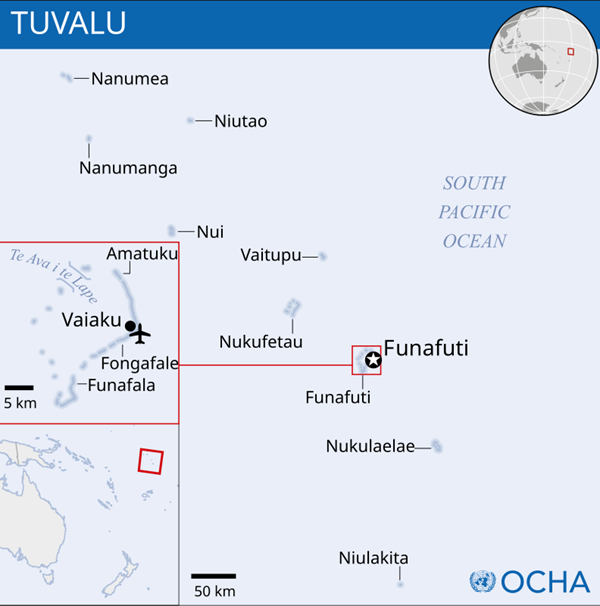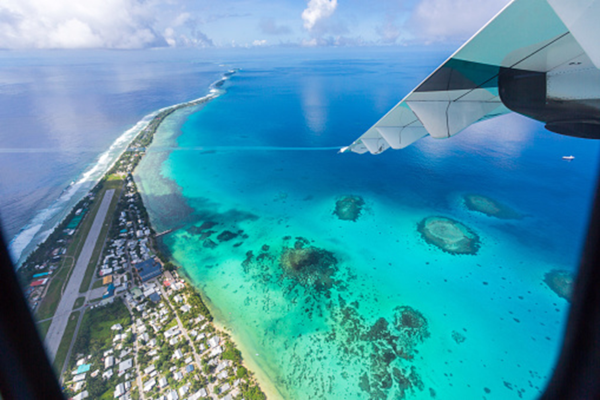Facts and figures
| Official name | Tuvalu |
| Country code | TV |
| Area | 25km2 |
| Coastline | 24km |
| Population | 10,643 |
| Capital city | Funafuti |
| Timezone | UTC+12 |
| GDP | $USD 0.63 billions |
| Currency | TVD (Tuvaluan dollar $) , AUD (Australian dollar $) |
| Government type | Unitary parliamentary constitutional monarchy |
The ‘Know Your Region’ series is designed to support unit and individual professional military education on the Indo-Pacific region. It’s important for all serving members of our military to have a foundational knowledge of the countries and issues in the Indo-Pacific.
On this page:
- Summary
- A short history
- People and society
- Language and religion
- Education
- Customs and traditions
- Fatele
- Cuisine
- Media and Internet
- Radio / TV / Internet
Summary
Tuvalu is located in the Pacific Ocean, halfway between Hawaii and Australia. It is composed of nine islands, most of which are low-lying coral atolls that are spread over 680 kms of ocean. The total land area is just 26 square kilometres, making it the fourth-smallest country in the world after Vatican City, Monaco, and Nauru. The population is estimated at around 11,500 people (2025), making it the third-least populous sovereign state globally.

Tuvalu Location – Wikipedia
The Funafuti Atoll is the nation's capital and home to the only international airport. Most government offices are located in the village of Vaiaku on the islet of Fongafale. Funafuti is the only urban centre and home to approximately half the country’s population.
The islands of Tuvalu are low-lying, with most no higher than 2-4 meters above sea level. There are no lakes or rivers; rain catchment and wells provide the only fresh water. Rainfall averages 100 inches (2,500 mm) in the north and 125 inches (3,175 mm) in the south.

The Funafuti Atoll – Wikipedia
A short history
In ancient times, Polynesians navigated across the Pacific using advanced voyaging techniques. Oral traditions suggest that ancestors of present-day Tuvaluans settled the islands around 1000 CE. Each island developed relatively independently, governed by chiefs and councils. Fishing and taro cultivation were central to early life.
Europeans first sighted the islands in 1568 when Spanish explorers passed through the Pacific. Regular contact came later in the 19th century when whalers and traders made their way into the region. Missionaries from the London Missionary Society (LMS) arrived in the 1860s, converting much of the population to Christianity. Religion became deeply rooted in Tuvaluan society, and churches remain central to village life today.
In 1892, Tuvalu was declared part of the British Protectorate of the Gilbert and Ellice Islands, administered together despite cultural differences. In 1916, the protectorate became a British colony.
During World War II, Tuvalu’s strategic location made it important to Allied forces. American troops occupied some islands, especially Funafuti, which served as an airbase for operations against Japanese forces in the Pacific. The presence of US forces introduced Tuvaluans to new technologies, goods, and improvements in infrastructure; however, many crops were destroyed to make way for military structures.
Following the war, tensions grew between the predominantly Micronesian Gilbertese (Kiribati) and the Polynesian Ellice Islanders. In 1974, a referendum was held, and the Ellice Islanders voted overwhelmingly to separate from the Gilbert Islands.
On the first of October 1978, Tuvalu became an independent sovereign state within the Commonwealth.
People and society
Tuvaluan society relies on strong communal ties, respect for elders and adherence to traditional customs. Extended families (kaiga) form the core unit of social life and land ownership is usually shared within kinship groups.
Tuvaluan customs emphasise collective living and respect for authority. Village life is organised around the falekaupule, the traditional assembly led by elders, which governs local affairs. Hospitality is very important – visitors are welcomed with food, gifts, and performances.
Traditional knowledge, such as navigation, fishing techniques, and local medicine are highly valued. Despite modern education and changes in lifestyle, cultural continuity remains strong through oral traditions and communal activities.
Language and religion
The official languages of Tuvalu are Tuvaluan (a Polynesian language closely related to Samoan and Tokelauan) and English. Tuvaluan is spoken in daily life, while English is used in government, education, and international affairs. Each island has slight variations in dialect. UNESCO has classified the Tuvaluan language as endangered.
Since the arrival of the missionaries in the 1860s. Christianity has played an important role in Tuvaluan society, with the Ekalesia Kelisiano Tuvalu (EKT), or the Church of Tuvalu, as the main denomination. Around 97% of the population identifies as Christian, and church attendance is high. Religious gatherings, singing, and community feasts are important aspects of daily life.
Education
Education is free and compulsory for children up to the age of 15. Literacy rates are high, with over 95% of the population able to read and write. Tuvalu has limited higher education facilities, so many students pursue further studies abroad, mainly in Fiji, New Zealand, and Australia.
Customs and traditions
Fatele
The fatele or faatele is a traditional Tuvalu dance song. Dancers traditionally wear a Titi Tao (a traditional skirt placed upon another skirt) which is made from tuaakie strips tied and looped onto a main waistband. Floral headbands, armbands, and wristbands are also worn during performances.

Titi grass skirt – Auckland War Memorial.
During the fatele, women dance in lines while the men sit on the floor beating the time with their hands on the mats or on wooden boxes. The dancers enact the story being retold and the music finally climaxes and ends abruptly. Performances often occur during community celebrations, such as Tuvalu Independence Day (October 1), religious festivals, or when welcoming important visitors.
Cuisine
Tuvaluan food is based on locally available foods such as taro, breadfruit, coconuts, pandanus, and fish. Imported rice, flour, and canned goods have become common in modern diets. Traditional dishes are often cooked in underground earth ovens (umu), especially during communal feasts.
Media and Internet
Given its small population and geographic isolation, Tuvalu has limited media infrastructure. However, modern technology is gradually expanding access to everyone.
Radio
Radio Tuvalu (100.1 FM) remains the primary source of information for Tuvaluans (including emergency and disaster information) and has the widest reach. Local news and world current affairs programs translated into the Tuvaluan language are broadcast in the capital Funafuti and to the outer islands of the archipelago.
Television
In December 2019, the Tuvalu Broadcasting Association (TVBC) launched Tuvalu TV. This is the only local and free to air channel. All other channels on the platform require a subscription fee.
Internet and Phone
The internet has become increasingly important for Tuvalu, both economically and socially. The country’s .tv domain is leased to international companies, providing vital revenue. Internet service and mobile coverage are poor, with regular, sudden blackouts. There has been a high uptake of Starlink (even before the Tuvalu government had granted a licence for the deployment of Starlink) which is out-competing unreliable and costly local service providers.
Australia has contributed AUD $53 million toward Tuvalu’s first undersea cable connection (the Tuvalu Vaka Cable), activated in October 2025, to enhance access to global information and essential services. The CEO of Tuvalu Telecommunications Corporation, Tenanoia Simona, has said “reliable internet connection has opened up access to online education, remote work opportunities, and digital services that were previously out of reach.”
Social media platforms such as Facebook are popular, serving as a primary means of communication and news-sharing. For many Tuvaluans abroad, the internet is the main link to family and culture.
For more general information on Tuvalu, see the resources below:
Videos
Podcasts
- Tuvalu: The Least Visited Country in the World (Everything Everywhere, 9m28s)
- The challenges that locals face in Tuvalu as they embrace a modern world, combined with maintaining traditional knowledge (ABC Pacific Prepared, 29m50s)
Articles
- Tuvalu | Population, Map, Currency, Language, Capital, & Size | Britannica Tuvalu | Australian Government Department of Foreign Affairs and Trade
- Tuvalu – The World Factbook
- History of Tuvalu | World of History
- 'Timeless Tuvalu' and the role of migration | Lowy Institute
- State of the Media: Tuvalu, 2025
- Tuvalu: The First Digital Nation?
- Can ‘Digital Tuvalu’ Survive a Cyberattack? – The Diplomat
Know your region
Know Your Region series gives you a shortcut to understanding other nations in the Indo-Pacific region.









